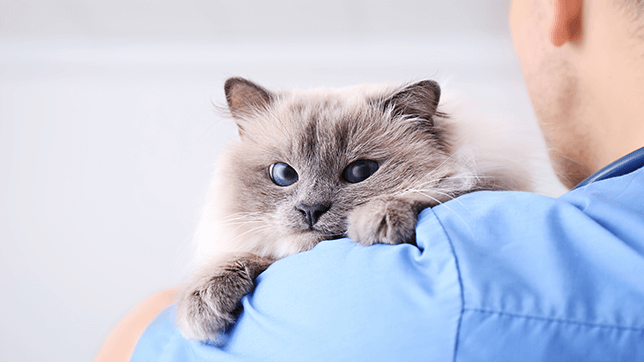16th November 2022
Cancer in cats

Sadly, our cats can be affected by the same conditions as us humans, with some developing cancer during their lifetime. Our feline friends are also masters in disguising their discomfort which can make it harder to spot the signs of certain diseases, meaning it’s often caught in later stages
Understanding the different types of cancer in cats and learning the symptoms can help ensure your pet gets the help they need, when they need it.
What is cancer?
Cancer is a disease caused by a collection of abnormal cells within the body that continue to grow and divide, which usually results in growths or lumps called tumours.
There are two types of tumours, benign and malignant. Benign tumours are non-cancerous and stay where they are first formed, usually making them relatively easy to treat. Malignant tumours are often aggressive and invasive, disrupting the normal functioning of the body and its organs.
Signs of cancer in cats
Since there are many different types of cancers in cats, signs of the disease can vary and can be difficult to spot thanks to our feline friends and their ability to hide their pain. Unless your cat develops a lump that you can see or feel, you’ll need to pay more attention to their behaviour and mood instead.
Possible symptoms of cancer in cats include:
- Unexplained weight loss
- Lumps (especially if they have grown rapidly)
- Coughing or difficulty breathing
- Tiredness
- Vomiting and diarrhoea
- Sores that won’t heal
- Blood in stools
- Changes in toileting (toileting more often or having trouble)
Common types of cancer in cats
Lymphoma
Lymphoma is one of the most common forms of cancer in cats and develops in blood cells found in lymph nodes or internal organs, such as the liver, kidneys, spleen and gastrointestinal tract. Modern treatments can be highly effective in providing some control of the disease, minimising symptoms and helping prolong a cat’s life for a number of months or years.
Mammary cancer
Early detection is important with mammary tumours as they can spread quickly. This type of cancer can usually be prevented by early neutering.
Skin cancer
Most commonly found in hairless or light-haired cats, because their skin is more vulnerable to UV-light, skin cancer tumours tend to be found on a cat’s ears, nose or eyelids.
Fibrosarcoma
An aggressive cancer that is slow to spread, fibrosarcoma starts in cells found in connective tissues, cartilage, and fat under a cat's skin and can sometimes grow back after removal.
How will my vet diagnose cancer?
Cancer in cats can’t be diagnosed by looks alone, so your vet may suggest blood tests and x-rays if they suspect your cat has a tumour. From there, a biopsy might be needed to establish whether the growth is benign or malignant whereas an ultrasound or MRI scan can help them see how far the disease has spread.
Treating cancer in cats
The treatment offered will depend on the type of cancer, its location, how far it has spread or developed, and what’s best for your cat’s quality of life.
Treatment types may include:
- Surgery
- Chemotherapy
- Radiation
- Immunotherapy
Taking your cat for regular vet check-ups and keeping an eye on their behaviour and mood will help ensure that any cancer is caught early. If you find a lump or are unsure about a change in your cat, contact your vet straight away.
Looking for more cat advice?
We’ve written some handy cat advice guides, to help you unlock the secrets of your mysterious moggy.
Need cat insurance?
Cat insurance can help cover the cost of veterinary treatment if your cat gets injured or falls ill.
We know pets
Our pets are part of the family. To achieve our vision of a better future for pets everywhere, we work with our partners, vets, and other veterinary professionals who are pioneering the latest advancements in animal care. Our campaigns, articles, and events are crafted to support, educate, and celebrate pet owners, while our policies are designed to provide peace of mind at an affordable price.
Yet our policies don’t just protect against the unexpected – they have purpose, too.
Since we were founded over 25 years ago, we've provided industry-leading policies that protect the nation’s pets, while also making a difference to animal welfare and our planet. Thanks to you, our policyholders, we've donated over £9 million to more than 830 animal welfare charities and conservancies, helping to support vulnerable pets and wildlife around the world.
We’re proud to be wildly different. Are you?
